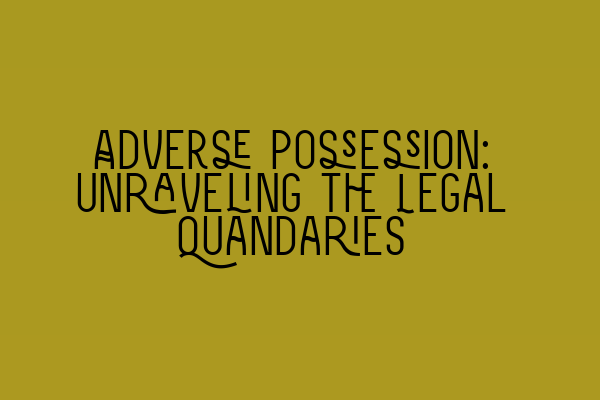Adverse Possession: Unraveling the Legal Quandaries
Welcome to the SQE Property Law & Land Law blog! In today’s post, we will be delving into the intricate world of adverse possession. Adverse possession is a fascinating legal concept that can often lead to complex disputes and legal quandaries. Understanding the nuances of this area of property law is essential for both solicitors and property owners alike.
What is Adverse Possession?
Adverse possession refers to the legal principle that allows an individual to gain ownership of someone else’s property through continuous and exclusive possession for a specified period of time. The concept may seem bizarre at first, but it serves an important purpose in the legal system. Adverse possession is based on the idea that landowners should not be able to leave their land unused, neglecting any responsibility for it while others potentially make beneficial use of it.
The Requirements for Adverse Possession
To establish adverse possession, certain requirements must be met. Let’s break them down:
1. Actual Possession: The possessor must physically possess the land and use it as an owner would. Merely having a legal right to enter the land or occasional use is not sufficient.
2. Exclusive Possession: The possession must be exclusive, meaning that the possessor has sole control over the land and excludes others from using it. Shared possession with the true owner or other third parties would not satisfy the requirement.
3. Continuous Possession: The possession must be continuous and uninterrupted for the specified period of time. Any gaps in possession may prevent a claim for adverse possession.
4. Open and Notorious Possession: The possessor’s use of the land must be open and easily observed by anyone with a reasonable interest in the property. Secret or hidden possession does not meet this requirement.
5. Hostile Possession: This refers to the possession of the land without the true owner’s permission. The possessor must intend to assert ownership rights over the land against the true owner.
6. Statutory Time Period: The period of continuous possession required varies depending on the jurisdiction. In England and Wales, the Prescription Act 1832 sets out a minimum of 12 years, while in other jurisdictions, it may vary.
Legal Quandaries in Adverse Possession Cases
Adverse possession cases can present a myriad of legal challenges, often resulting in complex disputes. Some common legal quandaries that arise in adverse possession cases include:
1. Boundary Disputes: Adverse possession can lead to disagreements over the correct boundary line between properties. Determining the true boundaries can be crucial in these cases.
2. Trespass Claims: The true owner may assert a trespass claim against the possessor, challenging their right to possession. Resolving these claims requires an in-depth analysis of the facts and legal arguments.
3. Disputed Ownership: Adverse possession can call into question the true owner’s title to the property. This can lead to lengthy legal battles to determine the rightful owner.
4. Statutory Exceptions: Some jurisdictions have specific statutory exceptions to adverse possession. For example, certain types of land, such as Crown land or registered land, may be exempt from adverse possession claims.
Seeking Legal Advice
Given the complexities surrounding adverse possession cases, seeking legal advice from experienced property law solicitors is essential. Our team at SQE Property Law & Land Law specializes in navigating the intricacies of adverse possession disputes. We are here to provide expert guidance and representation to both claimants and true owners in these challenging cases.
Conclusion
Adverse possession is a fascinating yet complex area of property law. Unraveling the legal quandaries surrounding adverse possession requires a deep understanding of the requirements, as well as an in-depth analysis of the specific circumstances of each case. If you find yourself involved in an adverse possession dispute or need assistance with property law matters, contact the team at SQE Property Law & Land Law. We are here to provide professional and knowledgeable legal support.
Related Articles:
– Misrepresentation in Contracts: Unveiling Deceptive Practices
– SQE Contract Law: Analyzing Landmark Cases and Influential Judicial Decisions
– Understanding Contractual Capacity: Rights and Limitations
– Interactive SQE Mock Tests for Contract Law: Test Your Knowledge
– Join Our SQE Contract Law Webinars: Expert Insights and Guidance
